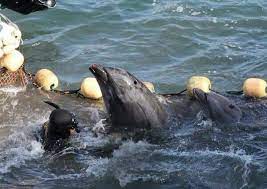Dolphin-Eating Japanese Villagers Have High Mercury
Residents of the dolphin-hunting village depicted in Oscar documentary “The Cove” have dangerously high mercury levels, likely because of their fondness for dolphin and whale meat, a government lab said Sunday.
The levels of mercury detected in Taiji residents were above the national average, but follow-up tests have found no ill effects, according to the National Institute for Minamata Disease. The tests were done on hair samples from 1,137 volunteers of the town’s roughly 3,500 residents.
“The results suggest there is a connection between hair mercury levels and eating cetaceans,” Director Koji Okamoto told reporters at town hall.
Mercury accumulates up the food chain, so large predators such as dolphins, tuna and swordfish tend to have the highest levels. The latest studies published by the Japanese government show that meat from bottlenose dolphins had about 1,000 times the mercury content of that from sardines.
Fetuses and small children are particularly vulnerable to mercury, which affects the development of the nervous system. The Health Ministry recommends that pregnant women eat at most 2.8 ounces (80 grams) of bottlenose dolphin per two months.
Environmentalists have long protested Taiji’s dolphin slaughter and Japan’s whaling activities, and have adopted the mercury issue as part of their cause.
“If you’re eating dolphin meat, you’re eating poison, and if you’re eating a lot of dolphin meat, you’re eating a lot of poison,” said Louis Psihoyos, director of “The Cove,” which won an Academy Award earlier this year. He spoke to the AP by phone from Los Angeles.
Taiji had been considering adding a mercury test to its standard set of health checks for several years. The town government last year contacted the institute, which agreed to perform and pay for mercury tests as part of its research, according to Yoshio Kaino, a Taiji official who oversaw the program.
Various tests were done from June of last year through February. On Sunday, a town hall meeting was held to explain the results, and about 100 Taiji residents who attended were told that there was no need for most of them to change their diet, although future tests are necessary.
Individuals with the highest levels were advised to cut back on large fish and sea mammals. Although it can damage the nervous system permanently, mercury naturally fades from the body over time, halving about every 70 days. A person could flush most of it from their system by completely cutting it out for a year.
At lunch after the town hall meeting, council chief Katsutoshi Mihara rejoiced as he carefully dipped raw slices of a striped dolphin into soy sauce.
“This may seem nonchalant, but I have absolutely no concerns, and I want to be able keep my lifestyle,” he said.
As served at “Moby Dick,” a hotel run by the local government, the red and pink dolphin sashimi was chewy and faintly fishy, its mammalian consistency more like meat than fish.
Despite the high mercury levels found in the Taiji tests, institute officials said neurological tests on the 182 citizens who wanted them found no problems. Follow-up tests are planned by March of next year, with outside experts possibly invited, and a separte study is under way to track mercury levels in the local catch.
At a presentation for the press on Sunday afternoon, many reporters questioned how there could be no health effects despite such high mercury levels, with some challenging the competency of the lab.
Joanna Tempowski, a scientist who works on chemical safety at the World Health Organization in Switzerland, said the Minamata institute was a respected institution that was trusted to provide technical assistance. Without seeing the Taiji results, she said that some damage from mercury might not appear immediately.
“At some point in the future they might start to show health effects,” she said.
Mercury poisoning is a sensitive topic in Japan, where a disorder now called Minamata Disease was linked to a chemical company that dumped tons of mercury compounds on the southern island of Kyushu.
The disease causes spasms, sensory loss and birth defects and can be fatal. The pollution continued for years after it was discovered, and Minamata disease became an international symbol of environmental damage and corporate corruption.
JAY ALABASTER, Associated Press Writer TAIJI, Japan


